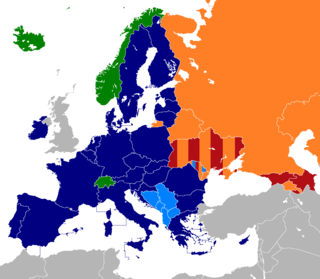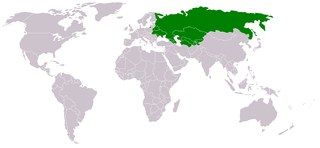A single market, sometimes called common market or internal market, is a type of trade bloc in which most trade barriers have been removed with some common policies on product regulation, and freedom of movement of the factors of production and of enterprise and services. The goal is that the movement of capital, labour, goods, and services between the members is as easy as within them. The physical (borders), technical (standards) and fiscal (taxes) barriers among the member states are removed to the maximum extent possible. These barriers obstruct the freedom of movement of the four factors of production.

The Commonwealth of Independent States (CIS) is a regional intergovernmental organization in Eurasia. It was formed following the dissolution of the Soviet Union in 1991, and is its legal successor. It covers an area of 20,368,759 km2 (7,864,422 sq mi) and has an estimated population of 239,796,010. The CIS encourages cooperation in economic, political, and military affairs and has certain powers relating to the coordination of trade, finance, lawmaking, and security, including cross-border crime prevention.

A trade agreement is a wide-ranging taxes, tariff and trade treaty that often includes investment guarantees. It exists when two or more countries agree on terms that help them trade with each other. The most common trade agreements are of the preferential and free trade types, which are concluded in order to reduce tariffs, quotas and other trade restrictions on items traded between the signatories.

The Eurasian Economic Community was a regional organisation between 2000 and 2014 which aimed for the economic integration of its member states. The organisation originated from the Commonwealth of Independent States (CIS) on 29 March 1996, with the treaty on the establishment of the Eurasian Economic Community signed on 10 October 2000 in Kazakhstan's capital Astana by Presidents Alexander Lukashenko of Belarus, Nursultan Nazarbayev of Kazakhstan, Askar Akayev of Kyrgyzstan, Vladimir Putin of Russia, and Emomali Rahmon of Tajikistan. Uzbekistan joined the community on 7 October 2005, but later withdrew on 16 October 2008.

The European single market, also known as the European internal market or the European common market, is the single market comprising mainly the 27 member states of the European Union (EU). With certain exceptions, it also comprises Iceland, Liechtenstein, Norway, and Switzerland. The single market seeks to guarantee the free movement of goods, capital, services, and people, known collectively as the "four freedoms". This is achieved through common rules and standards that all participating states are legally committed to follow.

At present, there are six multi-lateral free trade areas in Europe, and one former free trade area in recent history. Note that there are also a number of bilateral free trade agreements between states and between trade blocks; and that some states participate in more than one free trade area.
Economic integration is the unification of economic policies between different states, through the partial or full abolition of tariff and non-tariff restrictions on trade.

Greater Europe refers to the idea of an extended Europe that generally implies a Europe transcending traditional geographic boundaries to include trans-Eurasian countries, or countries in close proximity to Continental Europe with strong political, economic, or cultural links to Europe.
An economic union is a type of trade bloc which is composed of a common market with a customs union. The participant countries have both common policies on product regulation, freedom of movement of goods, services and the factors of production as well as a common external trade policy. When an economic union involves unifying currency, it becomes an economic and monetary union.

Treaty on Free Trade Area is an international treaty on a free trade regime in goods signed by 8 post-Soviet states on 18 October 2011, at a meeting of the Commonwealth of Independent States (CIS) Council of Heads of Government in St. Petersburg and entered into force on 20 September 2012. It creates Free Trade Area among Russia, Ukraine, Belarus, Moldova, Armenia, Kyrgyzstan, Kazakhstan and Tajikistan. This Treaty and other agreements within the Commonwealth of Independent States do not regulate relations with third countries, the terms of the CIS FTA allow member states to enter into the FTA agreements with other countries, as well as to join/create custom unions.

The Eurasian Development Bank (EDB) is an international development finance institution investing in the development of the economies, trade and other economic ties, and integration in Eurasian countries. The EDB was founded in 2006 and is headquartered in Almaty, Kazakhstan. The Bank has a branch in St. Petersburg and representative offices in Astana, Bishkek, Dushanbe, Yerevan, Minsk, and Moscow.

The Eurasian Economic Union is an economic union of five post-Soviet states located in Eurasia. The EAEU has an integrated single market. As of 2023, it consists of 183 million people and a gross domestic product of over $2.4 trillion.

The Customs Union of the Eurasian Economic Union or EAEU Customs Union is a customs union of 5 post-Soviet states consisting of all the member states of the Eurasian Economic Union which initially became effective on January 1, 2010 at the date of implementation of the common external tariff (CET) as the Customs Union of the Eurasian Economic Community or Customs Union of Russia, Belarus and Kazakhstan. It was inherited from the Eurasian Economic Community and is now regulated by Part Two of the Treaty on the Eurasian Economic Union, EAEU Customs Code, other international agreements and by decisions of supranational bodies as Supreme Eurasian Economic Council, Intergovernmental Council and Eurasian Economic Commission.
The future enlargement of the Eurasian Economic Union is theoretically open to any of the post-Soviet states and potentially any country of Europe or Asia. In order to accede, a state must fulfill certain economic and political requirements. Enlargement of the Eurasian Economic Union is also subject to the consent of all existing members and the candidate's adoption of existing EEU laws and implementing previous decisions made by the Eurasian Economic Commission. The present agenda of the enlargement of the Eurasian Economic Union is primarily focused on Tajikistan. Meanwhile, Moldova was granted Observer Status in April 2017, followed by Uzbekistan and Cuba in December 2020. The process of enlargement is referred to as Eurasian integration or Eurasianism. This term is also used to refer to the intensification of economic cooperation between Eurasian Economic Union member states.

The Eurasian Economic Union (EEU) currently comprises 5 member states, which are party to the founding treaties of the EEU and thereby subject to the privileges and obligations of membership. The constituent states of the EEU are placed under binding laws and have equal representation within the EEU's executive and judicial bodies. They do however retain considerable autonomy, and must be unanimous for the EEU to adopt policies or new member states. Consensus is a founding principle of the EEU.

The Agreement on the Establishment of a Free Trade Area is an international agreement on the intention to create a free trade regime in goods signed by 12 post-Soviet states on 15 April 1994, at a meeting of the Commonwealth of Independent States (CIS) Council of Heads of State in Moscow and entered into force on December 30, 1994. Article 1 indicated that this was "the first stage of the creation of the Economic Union", but on 2 April 1999 the countries agreed to remove this phrase from the agreement. Article 17 also confirmed the intention to conclude a free trade agreement in services.
The Agreement on Free Trade in Services, Establishment, Operations and Investment is an international agreement on the creation a free trade regime in services and investment signed by 7 post-Soviet states namely Russia, Armenia, Belarus, Kyrgyzstan, Kazakhstan, Tajikistan and Uzbekistan on 8 June 2023, at a meeting of the Commonwealth of Independent States (CIS) in Sochi, Russia to partly integrate Uzbekistan and Tajikistan on the common standards of the WTO and the EAEU even without their membership in the WTO (Uzbekistan) or the EAEU. It entered into force for Kyrgyzstan, Belarus and Tajikistan on 5 June 2024. It entered into force for Russia on 24 July 2024. On 14 October 2024, Armenia notified of its ratification of the Agreement and it enters into force for Armenia on 13 November 2024.

Eurasian economic integration is the process of economic integration of post-Soviet states which are geographically located in the center of the continent of Eurasia. Eurasian integration has been taking shape since 1991, originally via the establishment of the Commonwealth of Independent States in 1991, as noted in the World Trade Organization report. Currently, integration is primarily implemented through organizations that are open to accession by any post-Soviet countries, such as the Commonwealth of Independent States and the Eurasian Economic Union. An economic union means the deepest stage of economic integration.

The Common Economic Space is the goal and the result of the process of economic integration of post-Soviet states envisaged by the Article 7 of the Agreement on the creation the Commonwealth of Independent States signed on 8 December 1991. According to Article 7, the High Contracting Parties indicate that through common coordinating institutions, their joint activities will consist in coordinating foreign policy activities, cooperation in the formation and development of a common economic space, common European and Eurasian markets, in the field of customs policy, in the development of transport and communication systems, cooperation in the field of environmental protection, migration policy and the fight against organized crime.
Multi-speed integration refers to an integration community where participants independently choose to advance to different levels of integration, resulting in varying degrees of integration among members.











